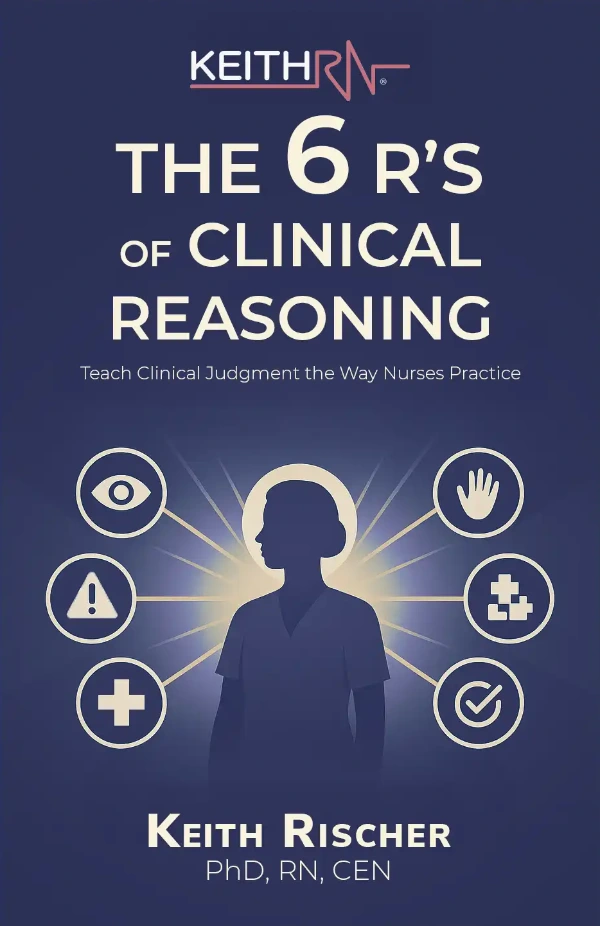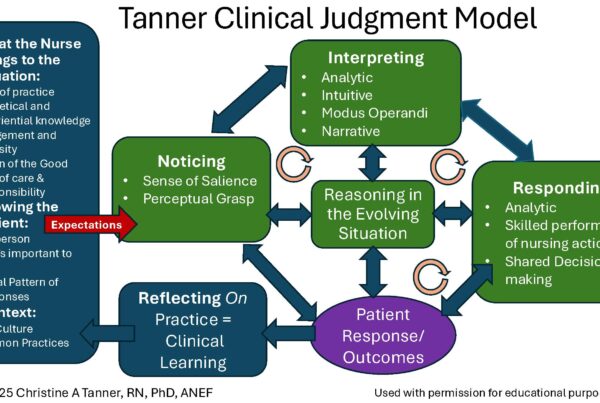
Clinical Judgment is the latest buzz word in nursing education today. Do you remember when it was critical thinking…and then clinical reasoning? The truth is, all 3 are needed!
This equation of professional practice, when understood then integrated into nursing education, can empower educators to develop clinical judgment needed for safe practice and licensure.
Critical Thinking + Clinical Reasoning = the Outcome of Clinical Judgment
The essence of critical thinking is when students understand essential content and are able to use and apply this knowledge to the bedside.
Clinical reasoning is the skill of thinking in action by using applied knowledge in the moment at the bedside of patient care.
When both are done in tandem by the nurse, the outcome of a correct clinical judgment is made at the bedside and when applying knowledge for any exam including the NCLEX!
Closing the Gap
Did you know that the academic-practice gap, which is the gap between how nursing is taught and experienced in real-world practice, has been documented as a problem for almost 50 years, yet still persists today?
To bridge the gap, educators need to bring clinical practice realities into the classroom, with salient practice-based case studies to develop clinical judgment.
This simple teaching strategy can empower educators to better prepare students for both practice and Next Gen licensure.
We have emphasized CBC (Concept-Based Curriculum) in nursing education the past ten years, but there is another CBC that should be more widely used in nursing education: Case-Based Curriculum.
Case-Based Curriculum has been emphasized in medical education successfully for decades and it’s time for nursing education to do the same!
A recent study, Case-Based Learning and its Application in Medical and Health-Care Fields: A Review of Worldwide Literature, made the following conclusions about the use of cases in education:
Case studies:
- Provide repeated experiences to practice clinical reasoning
- Immerse students in the complexity of clinical realities
- Aid in connecting theory to practice
- Offer improved problem solving skills compared to lecture
- Offer improved reflection ability compared to lecture
- Offer improved physical assessment skill development vs. lecture
In numerous studies that I used for the review of the current literature for my dissertation, identify the following benefits for students:
- Develop clinical reasoning and decision making skills
- Transfer learning to new cases/patients
- Show improved HESI and NCLEX pass rates compared to lecture
- Are engaged in the learning process
- Develop essential knowledge/skills
My dissertation further explores this topic. To learn more and review the status of the literature in chapter two of my dissertation, download it here: IMPACT OF UNFOLDING CASE STUDIES ON THE DEVELOPMENT OF CRITICAL THINKING IN BACCALAUREATE NURSING STUDENTS
I found that unfolding case studies act as a low-fidelity simulation, replicating the thinking in action of clinical reasoning so students can transfer knowledge from the classroom to bedside.
How many unfolding case studies does it take over the course of a semester to have an impact on developing critical thinking? According to the literature, it takes EIGHT in a semester, or one every other week.
However, not all case studies have equal learning value. Avoid case studies that:
- Emphasize application of knowledge, NOT higher level clinical reasoning skills
- Use multiple choice questions (nurses do not have this option in practice!)
- Use inconsistent frameworks
- Offer only a single level, one size fits all approach
Instead, KeithRN Clinical Reasoning Case Studies prepare students for NextGen plus clinical practice by Integrating Tanner’s Clinical Judgment Model (also the essence of the NCSBN model used to guide NGN).
KeithRN Case Studies offer the following benefits:
- Salient scenarios derived from lens of recent practice
- An emphasis on higher level clinical reasoning skills
- Open-ended questions that require deep reflection and understanding of essential content, no ability for students to guess their way through
- Different levels of complexity—the patient’s situation unfolds over time
- A consistent framework of clinical reasoning questions (each level has the same framework)
- Versatile application—can be used in classroom, clinical as a replacement activity, or in post-conference discussion or simulation prep
- An answer key for faculty!
In closing
Use case studies as a foundational strategy to bring practice realities into your content and practice clinical reasoning. KeithRN case studies are unique and provide an opportunity to practice clinical judgment using open-ended questions based on Tanner’s Clinical Judgment Model.
By developing the clinical judgment that many graduate nurses do not possess, transforming the way nursing is taught, and making learning active using case-based scenarios, the current academic practice gap can be bridged and closed once and for all.
Make a decision to be part of the needed change and do what is needed to best prepare your students for both practice and licensure.
Learn more in this video:
Keith Rischer – PhD, RN, CEN
As a nurse with over 35 years of experience who remained in practice as an educator, I’ve witnessed the gap between how nursing is taught and how it is practiced, and I decided to do something about it! Read more…
The Ultimate Solution to Develop Clinical Judgment Skills
KeithRN’s Think Like a Nurse Membership
Access exclusive active learning resources for faculty and students, including KeithRN Case Studies, making it your go-to resource.




